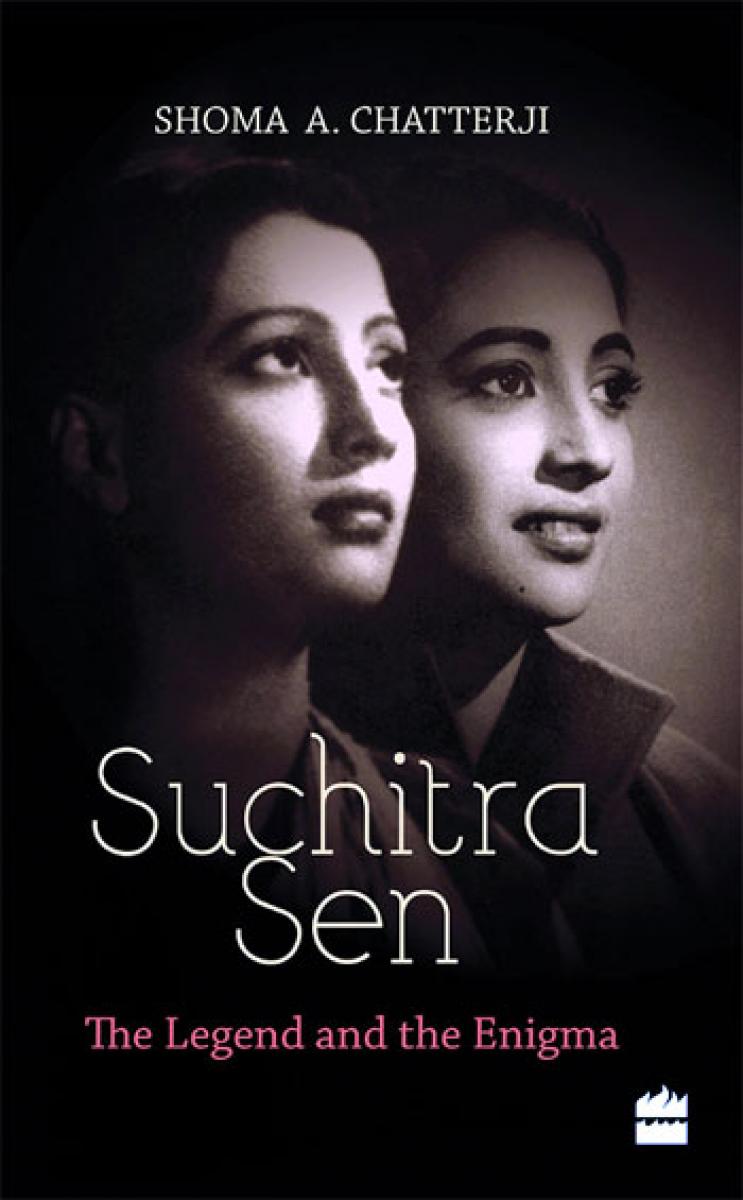Live
- Chandrababu envisions financial independence of women: Bhuvaneswari
- Cong MLAs protest at MP Assembly premises
- Velagapudi: Labour minister wants to transfer corrupt officials
- TTD to use Aadhaar to streamline services
- Empowering Women and Transforming lives with Solar Energy.
- Pawan promises end to ‘doli’ woes in tribal areas
- WB clears $800 million loan for Amaravati development
- Pay traffic challans within 3 months: SP Jagadeesh
- Kadiri: Bring land issues to officials’ notice
- Pilot project for land resurvey to be launched soon
Just In

x
Highlights
Suchitra Sen - The Legend and the Enigma; Author: Shoma A Chatterji; Publisher: Harper Collins India; Pages: 238; Price: Rs.350
 Title: Suchitra Sen - The Legend and the Enigma; Author: Shoma A Chatterji; Publisher: Harper Collins India; Pages: 238; Price: Rs.350
Title: Suchitra Sen - The Legend and the Enigma; Author: Shoma A Chatterji; Publisher: Harper Collins India; Pages: 238; Price: Rs.350Her forte was Bengali films, usually opposite Uttam Kumar, and she only appeared in a handful of Hindi films out of her 60-odd before retiring into seclusion a la Greta Garbo, but Suchitra Sen is still remembered for her classical beauty, her expressive features and dignified, understated portrayals of a range of morally complex roles. She also began acting after marriage and motherhood - a feat possibly achieved by just one more actress.
Also the only one to turn down an offer from Satyajit Ray and decline the Dadasaheb Phalke Award - Indian filmdom's most prestigious - if it meant a public appearance when she had retired from the world, Suchitra Sen was no less enigmatic even during her 25-year-long cinematic stint.
Known are her carefully calibrated but no less powerfully emoted performances in "Sharey Chuattor" (1953; the first of the 30 films opposite Uttam Kumar, "Sadanander Mela" (1954), "Harano Sur" (1957), "Saptapadi" (1961), "Saat Pake Badha" (1963) (all Bengali) as well as Bimal Roy's "Devdas" (1955; as faithful but luckless Paro opposite Dilip Kumar), "Bombai Ka Baboo (1965; opposite Dev Anand), "Aandhi" (1975) (all Bollywood) as well as "Uttar Falguni" (1963) and its Hindi remake "Mamta" (1966), but less known are the contours of her journey from Roma Dasgupta to Suchitra Sen.
There is much on Suchitra Sen in Bengali, but not much in English save for a small (in all senses of the word) introductory biography, and studies that exist focus on her long, successful cinematic partnership with Uttam Kumar, but filling this gap is award-winning film critic and journalist Shoma A. Chatterji, who had earlier penned the aforesaid profile.
It was not an easy task for the writer who asks herself if it is "possible to write the life story of a person the writer has never met in flesh-and-blood, and spoken to over the telephone only twice?" as well as "how honest is it to indulge in this second hand biography?"
But for Chatterji, who has the acclaimed "Paroma and Other Outsiders: The Cinema of Aparna Sen" to her credit, it was her "passion for cinema in general, and the star-persona of a legendary actress in particular" that triumphed and led her to an attempt "to present and portray Suchitra Sen from the standpoint of an avid viewer of films, a film critic and an author".
The end product is quite a comprehensive work aimed at most Indian (non Bengali-speaking and understanding) film aficionados, who have long admired the portrayals of Debjani/Pannabai/Suparna in "Mamta" or Aarti Devi in "Aandhi", and wanted to know more about this graceful and capable actress.
And they will not be disappointed - as they come to know of no less polished performances - as Archana of "Saat Pake Baandha", Rina Brown of "Saptapadi", psychiatrist Dr Roma Banerjee of "Harano Sur", dedicated nurse Radha Mitra of "Deep Jwele Jaai" and others.
Chatterji begins with an overview of the actress' early life and the unique circumstances in which she began her cinematic journey - with blessings of an enlightened and encouraging father-in-law, who hailed from one of the top families of Bengal.
The follows the story of her long-lasting and successful screen chemistry with Uttam Kumar, her metamorphosis from "star to actress" taking her non-Uttam Kumar films (as well as insightful comparison with other contemporary heroines - Nargis, Madhubala, Meena Kumari as well as Kanan Devi and Sabitri Chatterjee), an examination of her place in portraying working women and advancing feminism as well as in Bengali cinema as a whole, her over three decade-long secluded life and the possible reasons (including a reasoned critique why it differs from Garbo's case) and finally a summation.
Though it gets slightly academic at places, the book will appeal to not only to Suchitra Sen's fans but also students of of cinematic history and techniques as well as those who interested in films' portrayal and relation with society. Film buffs will also come to know some interesting trivia - as to which film inspired Shah Rukh Khan's Baazigar".
By the way, the other actress who began acting after becoming a mother was Suchitra's daughter, Moon Moon Sen!
(Vikas Datta can be contacted at [email protected] )

Next Story
More Stories
ADVERTISEMENT
© 2024 Hyderabad Media House Limited/The Hans India. All rights reserved. Powered by hocalwire.com







